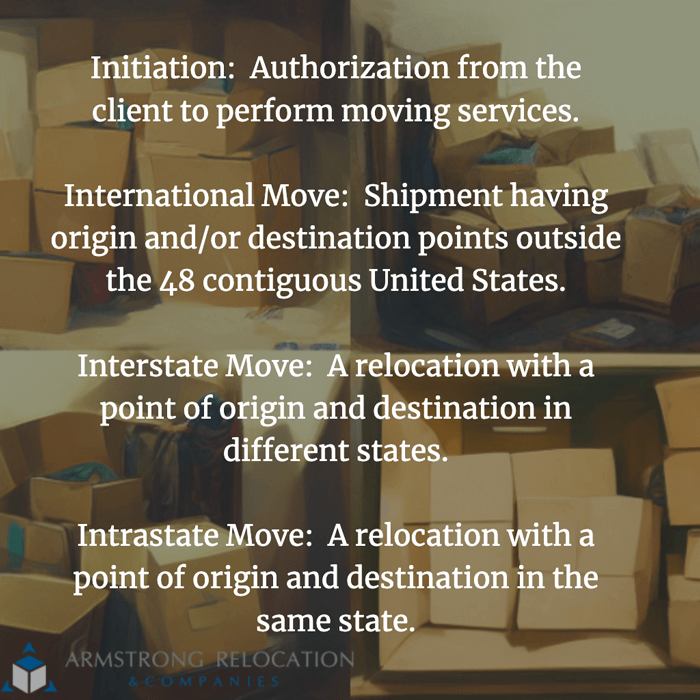The Essential Glossary of Moving Household Goods

Common Relocation Terms: Armstrong Relocation’s Handy Guide
Navigating the world of moving can be difficult.
Armstrong wants you to have all the tools you need to relocate with confidence, so we put together this handy list of household goods moving terms to help you. Here are the definitions of commonly used relocation terms and phrases from A to Z! This can help you from running into a surprise when you are scheduling your relocation.
Accessorial Charges:
Charges for moving goods other than transportation charges such as packing, unpacking, or crating.
Actual Charges:
The total cost of a move from start to finish including moving cost, warehouse fees, and final accessorial charges.
Agent:
A moving company (e.g., Armstrong Relocation) authorized to perform interstate or international moving services on a carrier’s behalf.
American Moving and Storage Association (AMSA):
The AMSA is a national organization comprised of moving companies whose mission is to uphold standards in the moving and storage industry.
Assembly and Disassembly:
A service offered by moving companies that will take apart furniture, load it into your moving truck, and reassemble it at your new location.
Bill of Lading:
A legal document that outlines the details of a move from the shipping date to the loading of the items onto a moving truck. This document is legally binding and serves as a receipt of the agreement between a moving company and the client.
Bulky article:
Some belongings included in a shipment like televisions, large furniture, or pool table require extra handling to ensure safe transportation. Moving companies require a schedule of extra charges for such items.
Carrier:
The moving company providing interstate transportation of household goods under whose Department of Transportation registration the shipment is moved.
Claim:
Loss or damage of an item while in the care, custody, and control of an agent.
Client:
An individual, organization, or organization purchasing moving services.
COD (Cash on Delivery):
Shipments where the client pays the moving charges at the time of delivery. For COD shipments, payment is required in cash or by traveler’s check, money order, or cashier’s check, or a credit card can be arranged with the booking agent with authorization arranged prior to loading.
Crating:
The process of using wooden boxes to pack and protect delicate or valuable items during transit.
Cube Sheet:
This is a list of household items and the amount of cubic feet they occupy in a moving truck. The cube sheet is converted into weight and used to determine the moving estimate.
Debris Pick‐up:
Removal of boxes and packing material after unpacking is complete.
Delivery Report:
A report that is used to verify the delivery of household goods at the final destination, which is then signed by the client.
Delivery Window:
The agreed-upon time period in which a moving company is scheduled to deliver a shipment to your new location.
Essentials Box:
This box of items will not be packed onto the moving truck. By putting your most essential items into this box and keeping it with you, you’ll have them close at hand during your last days at your old home and the first few days at your new home.
Full-Service Moving:
A service where a moving company completes the moving process from start to finish and provides materials, packing, loading, transporting, unloading, unpacking, and clean-up for the client.
Federal Motor Carrier Safety Administration (FMCSA):
The Federal Motor Carrier Safety Administration is an agency within the Department of Transportation that regulates requirements for moving companies, trucks, and equipment.
Exception:
Noting the condition of an item; used to determine responsibility for damage.
Hauling Agent:
An independent trucking company that contracts with a moving company to provide transportation services.
Household Goods Move (HHG):
Shipment consisting of household items and furnishings.
Impracticable Operations:
Conditions that require a moving company to use special equipment or additional labor and services. These terms are defined in a moving company’s standards and would be discussed before the move.
Inherent Vice:
When the condition of an item, like antiques, prevents a moving company from transporting it without causing damage.

Initiation:
Authorization from the client to perform moving services.
International Move:
Shipment having origin and/or destination points outside the 48 contiguous United States.
Interstate Move:
A relocation with a point of origin and destination in different states.
Intrastate Move:
A relocation with a point of origin and destination in the same state.
Invoice:
A final bill given to the client for authorized services performed.
Local Move:
A short-distance move that is usually made in less than 50 miles.
Moving License:
A required license issued to relocation companies by authorities for all moves local, cross-country, or international.
On‐time Delivery:
Delivery of goods within the agreed‐upon timeframe.
On‐time Pick‐up:
Loading of goods within the agreed‐upon timeframe.
Overflow:
Items authorized to be shipped, but left behind due to insufficient space on a van.
Peak Season:
Busy season for movers, usually May 15 through September 1, when capacity‐ driven rate premiums may apply.
Service terms:
An agreed-upon list of services your moving company delivers after your home evaluation and prior to your move.
Shuttle:
When physical constraints prevent the assigned van from normal pick‐up or delivery, use of a second, smaller vehicle is necessary to transfer articles between assigned van and location.
Spread:
Range of agreed‐upon pick‐up or delivery dates.
Storage Agent:
Agent performing storage transportation services at origin or destination.
Survey:
Examining a Client’s goods to determine what is needed to successfully complete a shipment; may result in a Move Estimate.
Team Member:
Employee, owner‐operator, crew member or agent servicing any aspect of a shipment.
Third-Party Charges:
Performance of services by a team contracted by the moving agent, having required expertise (e.g., crating of slate pool table).
Transit Time:
Time needed for a shipment to travel from origin to destination.
Valuation:
Amount of liability expressed by dollar value placed on a shipment by shipper; represents the maximum claim amount in the event of a covered loss or damage.
Van:
Specialized trailer constructed to haul household goods and other cargo.
Didn’t see a term you’re looking for or ready to get moving, give us a call at 800.288.7396
We’re ready to help you move from start to finish!
Building Trust. Reducing Stress. Delivering Reliability. Around the World.
